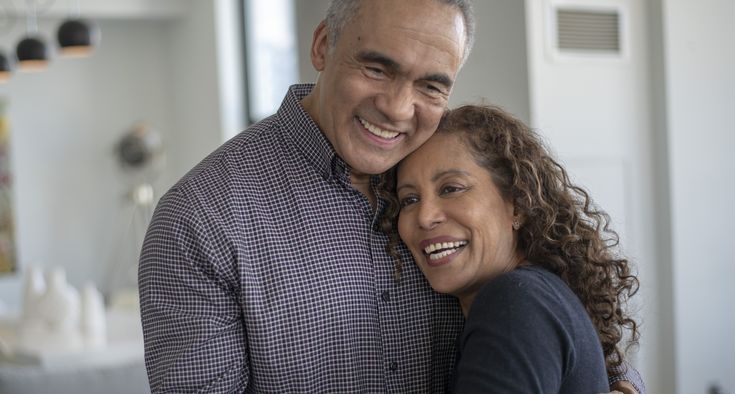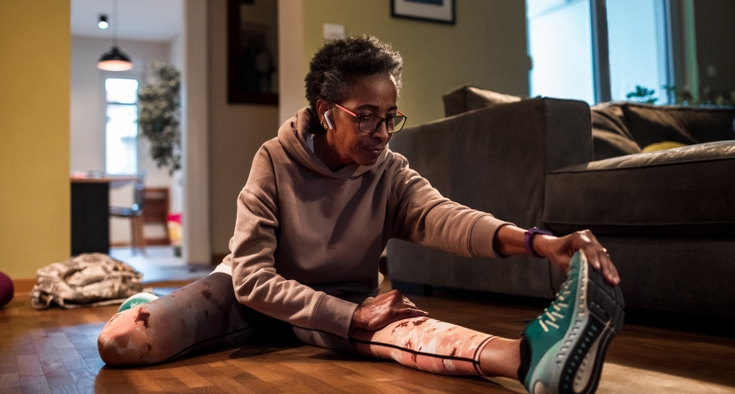We all know Alzheimer’s is a disease that gets worse over time. But that doesn’t mean it’s nothing but a straight decline. There are things people living with Alzheimer’s can do to continue to have fulfilling lives.
That’s the hopeful message from Dr. Robert Wiggins, a neurologist with Novant Health Neurology & Sleep - Midtown and director of Novant Health’s Memory Care Center in Charlotte.
Since June is Alzheimer’s & Brain Awareness Month (ABAM), Novant Health asked Wiggins and Katherine Lambert, CEO of the Alzheimer’s Association’s Western Carolinas chapter, to speak with local reporters about the disease, its early warning signs and what gives them hope.
Worried about your memory? Start with your primary care doctor.

There are 180,000 North Carolinians living with Alzheimer’s disease, 6 million Americans altogether and 55 million people worldwide who’ve been diagnosed with it. The disease – a form of dementia which results in cognitive impairment that leads to trouble performing daily tasks – has likely impacted your own family. Lambert often says, “It’s in your neighborhood and most likely on your street.”
She pointed out that, if you’re the caregiver for someone living with Alzheimer’s, you’re impacted, too. Significantly. Caregivers mustn’t neglect their own health.
After diagnosis, start with a deep breath
If you or someone you love is diagnosed with Alzheimer’s, the first thing to do, Wiggins said, is “take a deep breath.”
You may feel scared and alone, but think of the family and friends you can count on. “You don’t know what the future holds, but you can start thinking about who's going to be there with you,” Wiggins said. Tell your children and enlist their help.
Tell your other health care doctors and clinicians, too. “Even though a neurologist typically diagnoses and follows a patient who has dementia, it’s important that the patient continue with their primary care doctor and other providers,” Wiggins said.
There are steps you can take … and should
He added that one of the persistent myths about Alzheimer’s is that “we can’t do anything about it.”
“That’s false,” he said. “We need to shift our thinking. I encourage people to have hope. Neurodegenerative diseases do worsen. But that doesn't necessarily mean you have to only get worse. If we work on exercise, eating better, sleeping better, reducing conflicting medications and working on depression and anxiety, life can actually get a little better.
“If we just sit at home and don’t interact with people or address sleep issues or chronic pain and anxiety, then it probably will get worse,” he added. “But if we address these things, then I have hope people can increase their quality of life.”
Don’t forget: Healthy body, healthier mind
Diet and exercise play a big part in brain health.
“Trying to optimize our physical health as much as possible can be monumental in helping both patients and caregivers feel better,” Wiggins said. “It’s not so much about what the brain scan shows but about quality of life.
While the scientific community is working on slowing down the progression of, and preventing, Alzheimer’s, there are a lot of ways we can help ourselves.”
Don’t give up on life’s pleasures
After an Alzheimer’s diagnosis, life will look different. But it isn’t over.
Lambert said newly diagnosed people often despair they’ll have to give up travel. Not so.
A trip that involves lots of stops and starts, a different hotel every night, unpacking and repacking may not be enjoyable. But a more leisurely trip in which you’re in one locale for a few days or a couple of weeks can be a wonderful respite.
Air travel can be stressful for all of us these days. But it's especially taxing on someone with Alzheimer’s. If you’re flying somewhere, allow time to take rest breaks in the airport. Just getting through the security line can leave you frazzled. Reward yourself and the person you’re traveling with by stopping to catch your breath.
Wiggins said the pandemic made us all realize that we don’t know what the future holds. So, he tells patients, “Why wait five or 10 years for that exciting trip? Start planning it now. It may look different than you had planned, but that doesn't mean you can't do it.”
Getting to a diagnosis
Diagnosing Alzheimer’s involves talking with the patient and – crucially – their family and loved ones, a physical exam and complete medical history and, often, imaging tests that look for biomarkers of the disease.
One of the biggest risk factors is being over 65, Lambert said. If you’re 65 or older and have concerns about your memory, talk to your doctor at your annual wellness visit.
Cognitive decline in someone is often noticed first by a family member. They need to act and commit to being their advocate.
"Don’t bury your head in the sand and pretend not to see what you see,” Lambert said. Broaching the subject with your family member won’t be easy – but delaying it doesn’t make the issue go away.
Maybe it’s not Alzheimer’s
Cognitive decline doesn’t always equal Alzheimer’s. Doctors start by investigating other possible causes and ruling them out.
Wiggins wants to know, for instance, all the medications his patient is taking “to make sure the medications aren’t the problem,” he said. “Medication can be very helpful … when used correctly, but it can be hurtful when used in the wrong proportions or in conjunction with another medication” that could cause a reaction.
Lambert said poor sleep could also be the culprit for what appears to be dementia. A sleep study can determine the quality of sleep the person’s getting. “The best news you could get is that this is only a medication interaction or that you just need a little more sleep,” she said. “And it’s better to know these things early.”
Starting the conversation
If you’re pretty certain the signs you’re seeing in a loved one point to cognitive decline, initiate a conversation. (The Alzheimer’s Association can help.) “Try to take the emotion out of it,” Wiggins said.
Lambert said this conversation may be a good time to ask if they still feel safe driving. If they say yes, ask if they’d feel safe driving their grandchildren. That often elicits a more cautious response.
Alzheimer’s or normal aging?
If you’re wondering if the memory loss you’ve noticed is normal or something more serious, check out the Alzheimer’s Association’s “10 Early Signs and Symptoms of Alzheimer’s.”
The first sign of Alzheimer’s is “memory loss that disrupts daily life.”
“One of the most common signs of Alzheimer’s … especially in the early stage, is forgetting recently learned information,” according to the website. “Others include … asking the same questions over and over and increasingly needing to rely on … reminder notes or electronic devices … for things they used to handle on their own.”
By contrast, sometimes forgetting names or appointments, but remembering them later is a normal part of aging.
Even something that seems like a sure sign of Alzheimer’s could have a reasonable explanation, Lambert said. She gave an example of someone finding the TV remote in the refrigerator. Surely, that’s a sign of Alzheimer’s, right? Not if you can retrace your steps and make sense of it.
Let’s say the person was making dinner, holding the remote in her hand and headed to the fridge to get out the salad dressing when the phone rang. You can easily see how she may have absent-mindedly left the remote in an unlikely place. In a case like this, there’s no cause for alarm.
If someone who’s never been good at math struggles to figure out how much tip to leave a server, that shouldn’t be troubling, Lambert said. If someone who’s always been a numbers whiz suddenly can’t add the tip, that’s a bigger deal.
For anyone who worries about occasional forgetfulness, Wiggins mentioned “modifiable risk factors” people in their 20s, 30s and 40s can work on. They include “not smoking; working on cardiovascular risk factors – trying to make sure all the arteries that go to the heart and brain are as clean as possible; decreasing ‘brain off time,’ where you're just vegging out and watching mindless TV.”
Why good notes can help a doctor
Another way you can help a spouse, parent or other family member? Start taking notes. “You don’t have to make the diagnosis,” Wiggins said. “But you’re our best information-gathering source. You provide the collateral information we need to make a diagnosis.”
The more specific you can be in your notes, the more you’ll help the doctor. Don’t just write “memory trouble.” Write down specifically what the person did or forgot.
Coming to doctors’ appointments with the family member is invaluable. “This is a team sport,” Wiggins said. “I’m going to engage my medical assistant, a social worker, a nurse. I appreciate when a patient shows up with their team, too.”
It’s crucial for another person to be present at doctors’ appointments if medications are discussed – as they often are. “If we’re talking about starting or decreasing medication, we need to do it in a way that’s safe,” Wiggins said. “We’ll come up with a plan, but if the patient can’t follow the plan, it can be counterproductive. It’s extremely helpful to have someone there as a second set of ears.”
Getting support: 24-hour help line
The Alzheimer’s Association is a powerful source of information and support. “We hope people find us early – before a diagnosis,” Lambert said. “It’s emotional to get the diagnosis, even if it doesn’t come as a surprise.”
Both experts referred to Alzheimer’s as a marathon and not a sprint.
The Alzheimer’s Association operates a 24-hour help line at 800-272-3900. Trained clinicians are available to answer questions and offer support. “It’s help in the moment, but it’s also ongoing help as you need it,” Lambert said.












